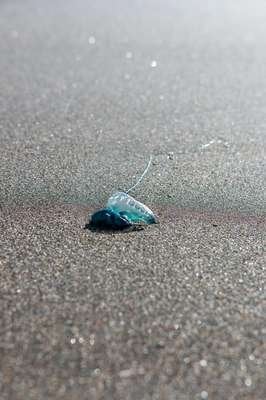You Won't Believe What This Woman Did on the Beach That Has Aussies Outraged – Avoid Her Mistake!
By
Danielle F.
- Replies 14
The Australian coastline is a treasure trove of natural beauty, but it also harbors some hidden dangers that can catch even the most seasoned beachgoers off guard. In a recent incident that has left many Aussies stunned, a South Australian woman's innocent mistake serves as a stark reminder of the perils that can lurk in the sands and shallows.
While enjoying a leisurely stroll along the picturesque Great Ocean Road, the woman stopped at Massacre Bay in Victoria, where she encountered what she thought was 'plastic rubbish' amidst the kelp and seaweed on the shore. Little did she know, she had stumbled upon a congregation of bluebottles – a type of jellyfish notorious for their painful stings.
Unaware of the danger, the woman picked up several of the creatures and took a photo, which she then posted to a dedicated Facebook group, asking for identification. 'Any ID thoughts?' she inquired, not realizing the risk she had just taken.
The online community was quick to respond, with many expressing shock and concern. 'Don't touch them!' one person warned, while another advised, 'Just a tip, if you don't know what something is, don't pick it up.' The sentiment was echoed by others, with one commenter expressing disbelief: 'I can't believe people don't know what a bluebottle is.'
Bluebottles, also known as Portuguese man o' war, are a common sight on Australian beaches during the summer months. Their long, venomous tentacles can inflict stings that result in intense pain and itchy blisters. With up to 30,000 bluebottle stings reported annually in the country, it's crucial to know what to do if you find yourself on the receiving end of their sting.
If you're stung by a bluebottle this summer, experts advise against the old wives' tales of using vinegar or urine on the affected area. Instead, the best course of action is to rinse the area with seawater, carefully remove any tentacles still attached to the skin, and then immerse the sting in hot water. Surf Life Saving Australia’s Dr. Jaz Lawes has emphasized that hot water is known to provide relief within 10 minutes and is the most effective treatment.
In an effort to better understand these marine stingers and potentially develop a 'forecast system' for their appearances, marine biologists from Griffith University and UNSW have launched the Bluebottle Watch project in partnership with Surf Life Saving Australia. This initiative aims to gather data on bluebottle movements and patterns, and Australians are encouraged to contribute by reporting any sightings. If you spot a bluebottle on the beach, snap a photo and upload it to the iNaturalist platform to aid in this important research.
The woman's close call is a timely reminder for all of us to exercise caution and respect for the marine life we share our beaches with. It's also a call to action to participate in citizen science projects that can help safeguard our coastal communities.

So, dear readers, let's learn from this woman's mistake and stay vigilant on our beautiful beaches. And remember, if you have a story tip or a personal experience with bluebottles you'd like to share, feel free to leave comments below. Stay safe and informed this summer, and let's keep enjoying the sun, sand, and surf responsibly.
While enjoying a leisurely stroll along the picturesque Great Ocean Road, the woman stopped at Massacre Bay in Victoria, where she encountered what she thought was 'plastic rubbish' amidst the kelp and seaweed on the shore. Little did she know, she had stumbled upon a congregation of bluebottles – a type of jellyfish notorious for their painful stings.
Unaware of the danger, the woman picked up several of the creatures and took a photo, which she then posted to a dedicated Facebook group, asking for identification. 'Any ID thoughts?' she inquired, not realizing the risk she had just taken.
The online community was quick to respond, with many expressing shock and concern. 'Don't touch them!' one person warned, while another advised, 'Just a tip, if you don't know what something is, don't pick it up.' The sentiment was echoed by others, with one commenter expressing disbelief: 'I can't believe people don't know what a bluebottle is.'
Bluebottles, also known as Portuguese man o' war, are a common sight on Australian beaches during the summer months. Their long, venomous tentacles can inflict stings that result in intense pain and itchy blisters. With up to 30,000 bluebottle stings reported annually in the country, it's crucial to know what to do if you find yourself on the receiving end of their sting.
If you're stung by a bluebottle this summer, experts advise against the old wives' tales of using vinegar or urine on the affected area. Instead, the best course of action is to rinse the area with seawater, carefully remove any tentacles still attached to the skin, and then immerse the sting in hot water. Surf Life Saving Australia’s Dr. Jaz Lawes has emphasized that hot water is known to provide relief within 10 minutes and is the most effective treatment.
In an effort to better understand these marine stingers and potentially develop a 'forecast system' for their appearances, marine biologists from Griffith University and UNSW have launched the Bluebottle Watch project in partnership with Surf Life Saving Australia. This initiative aims to gather data on bluebottle movements and patterns, and Australians are encouraged to contribute by reporting any sightings. If you spot a bluebottle on the beach, snap a photo and upload it to the iNaturalist platform to aid in this important research.
The woman's close call is a timely reminder for all of us to exercise caution and respect for the marine life we share our beaches with. It's also a call to action to participate in citizen science projects that can help safeguard our coastal communities.
Key Takeaways
- An Australian woman unknowingly handled bluebottles on the beach, mistaking them for 'plastic rubbish'.
- She posted a photo on Facebook seeking identification, whereupon she was warned about their painful stings.
- Experts advise against using vinegar or urine on bluebottle stings, recommending sea water rinse followed by hot water immersion for relief.
- A new 'forecasting system' project, Bluebottle Watch, asks Australians to report sightings of bluebottles to better understand and predict their presence on beaches.








